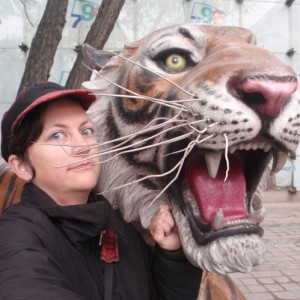
1. Who are the short fiction authors you admire (Australian or otherwise, alive or dead)?
There are too many. I’ll restrict myself to the living: Cate Kennedy, Paddy O’Reilly, Steven Amsterdam, Gillian Mears, Yiyun Li, Etgar Keret, Karen Russell, and I know he’s won too many awards to be fashionable now but I loved Peter Carey’s Fat Man in History.
2. What is the most memorable short story you have read? And why does it stand out for you?
I would have to cite Flannery O’Connor’s masterful story ‘A Good Man is Hard to Find’ for its humour, brutality, incredible tension, brilliant dialogue and character development. I still get shivers thinking about The Misfit. She was really a genius.
3. What do you like about the short story form?
It’s very flexible. I love its capture of pivot points, its nearly mathematical tidiness, and its risk. I can pull off imaginative feats in short stories which I would struggle to hold together in a novel. I like the adaptability of short fiction to different delivery modes, like podcasting. As a novelist, I like the gratification: the end of the job is in sight.
4. How would you describe your own writing?
I like to think of myself as a versatile writer, rather than a consistent one. I tend to buck a little at categorisation.
5. Which of your stories are you most fond of right at this moment and why?
The newest ones, of course. At the moment, that’s three that I wrote after being Asialink writer in residence in Beijing last year: ‘Aperture,’ ‘Architecture,’ and ‘Demolition.’
6. Where do the ideas for your stories come from? (Take us through an example)
Conversation, observation, speculation. Eavesdropping. My story ‘Plain Indians’ resulted from a conversation with a friend about land management in which we wondered why no-one had made a Western about bush regeneration. I ended up daring myself to do it.
7. What is your writing process – from idea to publication? (Do you go it alone or are others involved?)
I’ll jot down an idea and pretend to forget about it for a while, then one day I’ll start writing, usually when I am putting off some other unpleasant work. First draft often happens in a single sitting, but I will craft and carve away for months afterwards. I work alone until I think I am finished, then I like to put my stories to bed for a month or so and come back to them for a second or third finishing.
Very occasionally I will share work at a late draft stage with someone who was there for the story’s genesis. But usually I am on my own until it reaches an editor, with whom I hope I am gracious. I certainly appreciate good editors.
Many of my stories end up in zines or as podcasts on my website, so i am often involved in the publication too.
8. Do you feel the short story form is valued in Australia? What makes you say this?
By readers, definitely. As an online medium, it’s much more adaptable to new technologies and to the demands of our widening scopes of attention. I don’t have an ebook reader but I am a podcast addict. I think publishers are still catching up to the fact that short stories are the form of the future.
At the same time I think we have always valued a good story. I once had a stranger tell me Henry Lawson’s ‘The Drover’s Wife’ as though it had happened to one of his relatives. He seemed to really believe it was his own personal history and I hadn’t the heart to break it to the man that he had stolen it. The yarn-spinners of the NT are incorrigible plagiarists. But good stories can get inside you in a powerful way, become part of you, and I can’t see that changing.
9. How do you feel about your work being published in non-print forms such as digital and audio?
Love it. My enthusiasm for the DIY potential sometimes clashes with my respectable published life. I wish I had the time and cash to investigate all the possibilities of the various technologies. Hoping 2011 will see some new developments at jenjen.com.au. Meanwhile, I will keep podcasting every month or two.
10. What advice would you like to offer Spineless Wonders?
I can only repeat the best advice I ever received as a writer, which applies equally to small publishing ventures: Persist.
Jennifer Mills is the author of the novels Gone (UQP, 2011) and The Diamond Anchor (UQP, 2009) and a chapbook of poems, Treading Earth (Press Press, 2009). She was the winner of the 2008 Marian Eldridge Award for Young Emerging Women Writers, the Pacific Region of the 2008-9 Commonwealth Short Story Competition, and the 2008 Northern Territory Literary Awards: Best Short Story. Her work has appeared in Meanjin, Hecate, Overland, Heat, the Griffith Review, Best Australian Stories, and New Australian Stories, and she is a regular contributor to New Matilda and Overland. She lives in Alice Springs.
Her second novel, Gone, will be out through UQP at the end of February 2011.
To find out more about Jennifer Mills, and to listen to podcasts of her stories, visit her website www.jenjen.au
Follow Us:
Share this page:
